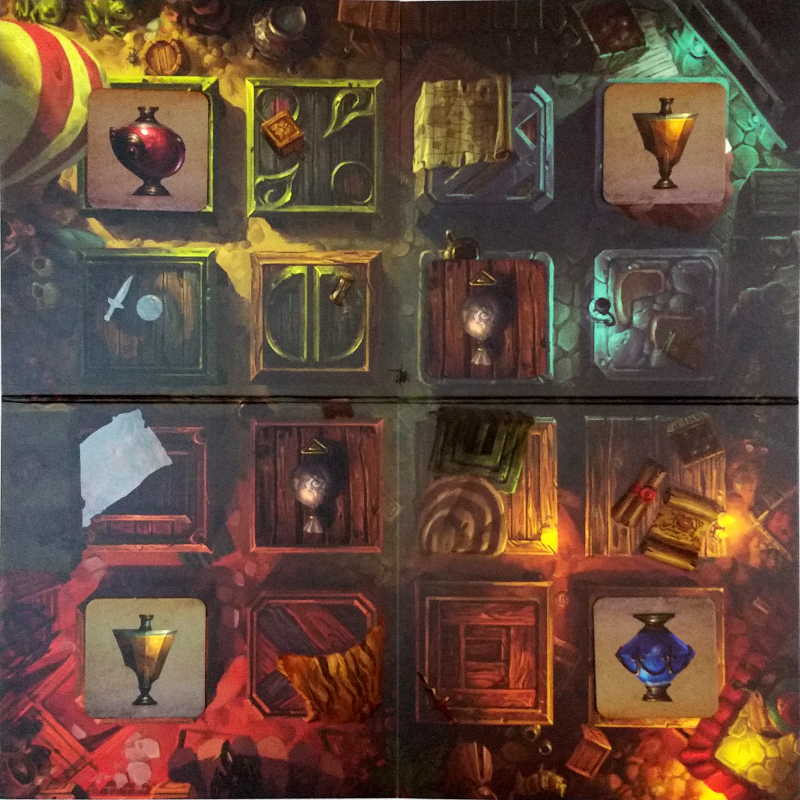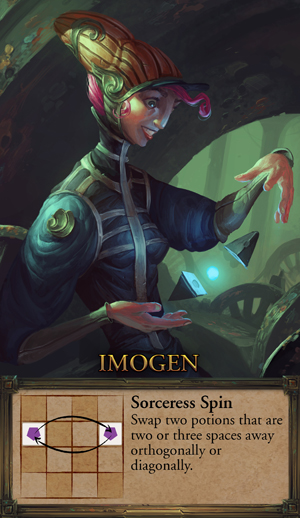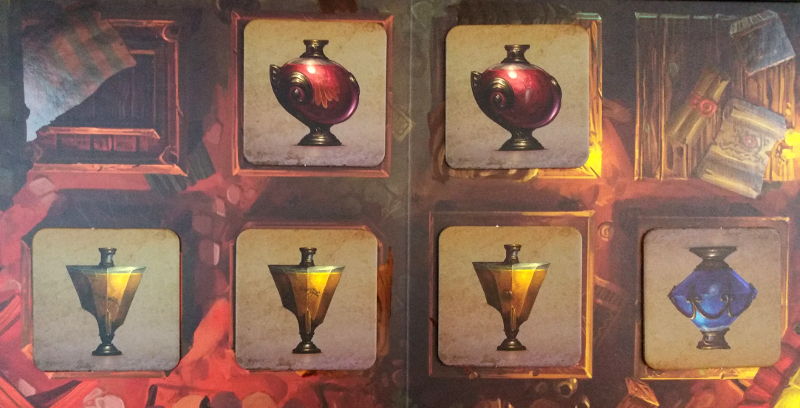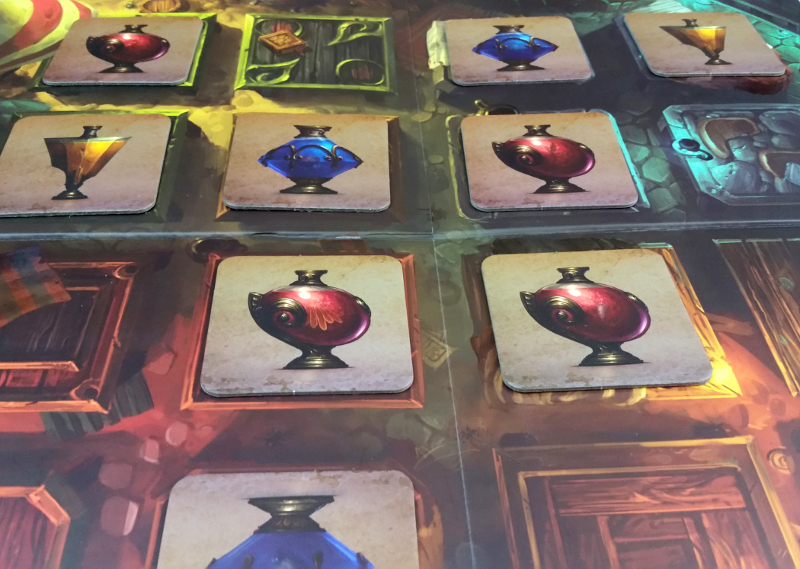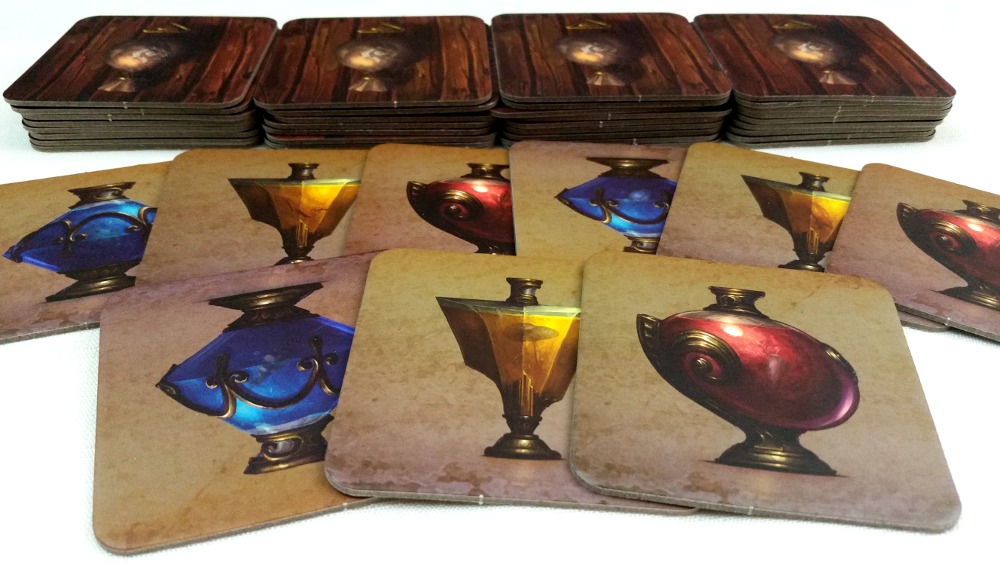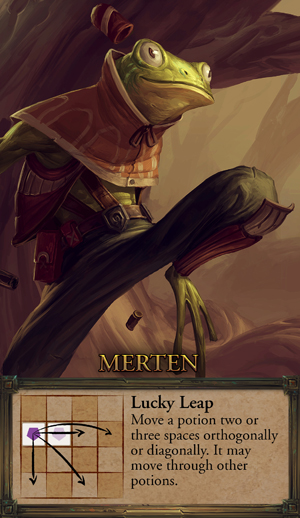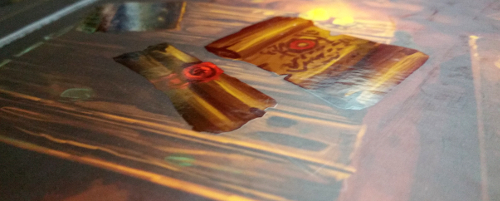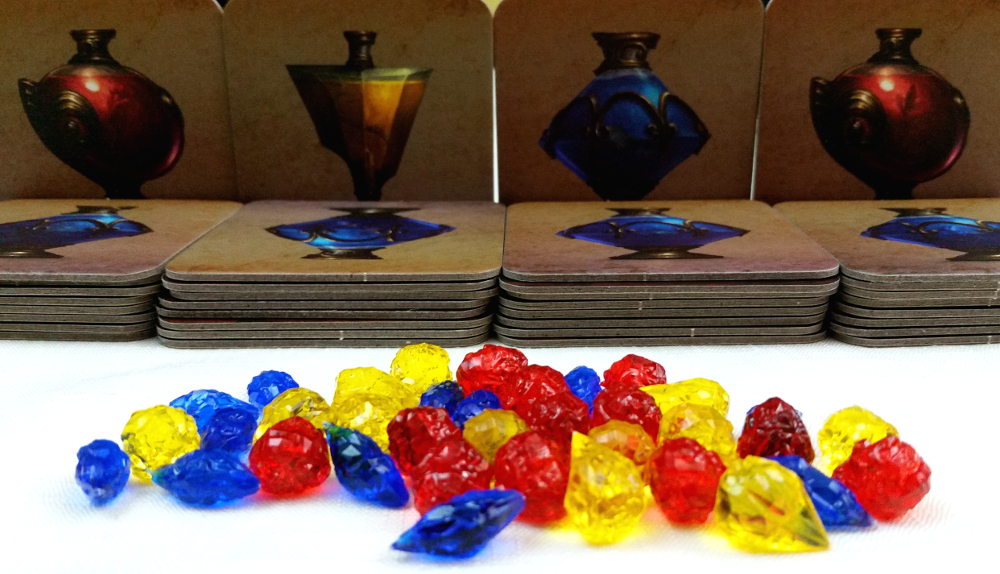Rolling her eyes at possibly being duped again, Caitlin Paye was crestfallen. There had been plenty of false leads and dead ends before, but she had been convinced that this time was for real. Her focus shifted back to the hastily scribbled note, which had been provided by a ‘reputable’ source – at least as reputable as one in her field. It simply read:
Corner of Fleet and Thames. 3PM, Tuesday
Yet here she was. 2:59 and…nothing. She poured over these seven words, as if doing so would miraculously reveal she had missed some major clue in finding the alchemist’s marketplace.
Resigning to the likelihood that it indeed was a wasted effort, Caitlin turned for home when her watch chirped 3. “Good afternoon Ms. Paye,” came a voice from behind her. “My name is Benedetto. Welcome to the marketplace. We’ve been expecting you.”
The Premise
The elusive Secret Potion Society has existed in the shadows for centuries, trading in the closely-guarded keys of the arcane underground. Recently they have initiated a contest for a spot in their ranks. As aspiring potion-makers, players have been invited to compete in the marketplace of the occult to prove who has the right ingredients to become their newest member.
The Rules
Apotheca is a game of set matching, spatial movement, and hidden information with light rules and an equally light setup time; the game consists entirely of a central board, potion tiles, a set of Apothecary cards, and a pile of gems.
To start, four potion tiles are randomly placed face-up on the corner spaces of the game’s 4×4 grid. Potion tiles come in three colors (Red, Blue, or Yellow). An additional two tiles are placed face-down on two of the center spaces.
Each player is then dealt a random Apothecary card. Every Apothecary card possesses a unique movement action to aid the player on their turn. Four of the remaining Apothecary cards are then revealed to create a purchasable row of cards, with each card space containing a specific gem cost.
The starting player is the person who is deemed the sneakiest. This is a secret contest after all.
The game consists of a series of turns, each allowing for two actions. On their turn, the player must take two of Apotheca’s four possible actions, and both actions must be different. These four actions are:
- Reveal: Flip a potion tile face-up and collect a matching gem of that color.
- Restock: Take the top potion tile from the stack and place it face-down on an empty board space with the tile back’s arrow facing that person. Repeat this process until the board has exactly three face-down tiles. A player may look at a potion tile pointing at them at any time.
- Hire: Choose one of the available Apothecaries and pay its gem cost, adding the card to the player’s tableau. Apothecaries either cost two gems of the same color or one of each kind, depending on the slot being taken from.
- Use A Power: Use an available Apothecary power as stated on its card. Players may use this action twice in the same turn so long as each action is from a different Apothecary.
If an Apothecary action results in a connected row of three or more tiles of the same color, the potion is completed. Those tiles are removed from the board and placed on one of the player’s Apothecary cards. However, once an Apothecary possesses a completed potion, their powers may no longer be used.
Players continue to take turns in this manner until one player (in a 2-3 player game) or a team of players (in a 4 player game) has completed three potions. At that point, the winning players are congratulated and whisked off to the mysterious and prestigious world of The Secret Potion Society.
Everyone else will be forced to drink their potions and hope they didn’t screw anything up.
Mixing The Right Ingredients
As singular game mechanics go, set matching is one of the more widely appreciated, in part because the whole concept of creating sets speaks to us on a base level. Over time, our adoration for patterns has shifted from a survival trait into a mental reward. Set matching draws upon our natural predilection to seek out and process various patterns as a decision-making process. Apotheca takes full advantage of this fact.
What makes Apotheca resonate as a particularly worthwhile game, however, is that it effortlessly entwines the rewarding sensation of set matching with that of hidden information, creating an interwoven exercise that’s equal parts spatial acuity and board manipulation. At its purist, Apotheca is one part mind game and one part swift tactical maneuvering.
This fusion of mechanics creates a gameplay experience that relies nearly as much on guessing what your opponent may do as it does taking your own actions.
Where do you place a potion such that your opponents won’t immediately benefit? Do you overtly strive for finishing a specific set, or do you go or the more secretive route using for a surprise completion? Then factor in what you think your opponent may do – and if there’s any way to stop them. It doesn’t take long to realize that in this game you aren’t merely moving a slate of potions around the table – you’re also actively trying to gain the upper hand on your competition.
Apotheca notably does this without ever veering into unnecessary complexity. The game does a decent job melding straightforward tile matching with a cerebral battle of wits, and yet Apotheca never wavers from being easy to follow and accessible to a wide range of players, all with a play time of under a half hour. Apotheca illustrates that a game doesn’t need to be complicated to offer an experience that’s both challenging, engaging, and short.
Due to its intuitive rule set and quick playthroughs, there’s no mystery here that Apotheca is right up Socializers‘ alley. What is surprising is that it’s equally desirable to Strikers, as these two archetypes often have opposing tastes. Nevertheless, Strikers will enjoy Apotheca thanks to being able to leverage goal-based decisions alongside the game’s low degree of luck beyond which tiles or cards are drawn.
On the other hand, this is not one secret society that Daredevils or Architects will be clamoring to join. Beneath all of the game’s outward appearances, Apotheca ultimately is a game of calculated spatial movement and tile matching that leaves little room for heavy risk taking or unconventional gameplay styles, nor does it provide the means to build or explore anything on a substantive level. In the end, this contest will leave them feeling stifled and bored.
Tacticians will suffer a similar reaction, though for almost the exact opposite reasons. One of Apotheca’s most clever aspects are the various movement combos that you can pull off by using multiple Apothecaries in the same turn, and exploring these card interactions is part of what gives the game its replayability value. However, since you lose those powers upon completing a potion, you rarely have more than two Apothecaries at a time – and even then not for long. As a result, Tacticians will be drawn in by Apotheca’s mechanics and will wholly appreciate combining powers together for different strategic moves, but their interest will eventually wane after a number of playthroughs due to the short play time and inability to plan more than a turn or two ahead.
Four’s A Crowd
As solid as Apotheca is, its one weakness is that it doesn’t scale particularly well with more players. Apotheca desires to be a two player game if at all possible, and it rewards you on that level with tight rules and game tension that is pleasant but not overpowering. The more players you add, however, the more that tightness fades.
Unfortunately, while three player games still largely work, four player iterations don’t fare nearly as well. For one, the more players there are, the harder it is to set yourself up for the next turn, making the game more chaotic than strategic. For another, four player mode is team-based, though you collectively still only need three potions to win – which is much easier to do as a team. This makes the game move along quicker but with less intensity or cohesion, and ultimately less excitement.
Poised For Success
Far less uneven is the game’s look overall. For a theme that’s all about secret potions and underground contests, Apotheca ironically puts on an excellent public spectacle. Indeed, Apotheca’s merit as a mechanically lightweight strategy title is surpassed only by its resplendent physicality, which is no small feat for a tile game.
Half of this aplomb is directly attributable the game’s visual appeal. From colorful component pieces and a small table footprint, Apotheca is the kind of game that exudes an inviting feeling right out of the box. A large part of this is due to the game’s superb illustrations.
The artwork in Apotheca ensures that every Apothecary card has a distinct look, providing variety to the game’s movement powers that would otherwise feel overly similar to one another. The Tidemaster looks quite different than Karinne, for instance, just as Solas is hard to mistake for good ol’ Merten. Thanks to diverse and vibrant character depictions, it’s quite easy to forget that the core of Apotheca is one of pure tactical movement.
This isn’t limited to the cards either. Apotheca includes extra detail everywhere, such as having unique ingredients within each potion tile. This shows an impressive level of accented detail for a game that doesn’t have a huge volume of components. Even the central board (which is otherwise almost superfluous) showcases some visual flair by including glossy graphic adornments while reinforcing the deep color palette found throughout the game.
The other half of the game’s optical merit rests with its stellar component quality; almost everything in Apotheca is comprised of highly sturdy materials. The potion tiles particularly stand out due to their large and surprisingly thick size, but rather than be a detraction, it instead further ties into the game’s overall casual-friendly aesthetic. The same goes with Apotheca’s stylized potion gems. These plastic tokens are so enticing to play with that it’s unfortunate they’re only used sparingly as the game’s currency.
For all of the game’s exemplary presentation, though, at its heart it’s still a tile-laying strategy game – albeit a particularly flavorful one. As such, while there’s enough allure to draw Immersionists into the not-so-unseen world of Apoethca, whether it has any staying power for them will depend on how much they enjoy the mechanics. They’ll appreciate the idea of creating potions to join a secret society, as well as the notion that completing a potion for an Apothecary negates their aid to you since you’ve completed their task, but there simply isn’t a deep well to keep them here in the long term purely on theme alone.
The Takeaway
There is no secret here – Apotheca is one solid concoction. With a 30 minute play time and easy to teach rules, Apotheca invites players into the unseen world of potion making with remarkable ease by using a smooth blend of set matching and mild Chess-like maneuvering. This welcoming setting is further bolstered by how well the game composes itself. From flavorful apothecaries to colorful gems to (almost overly) durable tiles, Apotheca boasts an impressive component quality to match its lightweight-yet-thinky tone. The game does a remarkable job providing substantive turn-based decisions without actually being incredibly deep or complicated, and while the basic gameplay doesn’t vary much between playthroughs, the game never feels stale. Indeed, Apotheca is a simple game that happens to do its one thing exceptionally well. When you combine these ingredients together, you get a top-notch, tactically-focused Gateway Game that’s as accessible as it is pretty.
Apotheca is a product of Knapsack Games and Renegade Games Studios.
Cardboard Republic Snapshot Scoring (Based on scale of 5):
Artwork: 4.5
Rules Clarity: 5
Replay Value: 4
Physical Quality: 5
Overall Score: 4.5

